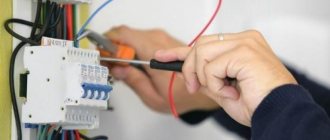Modern legislative acts oblige property owners to install devices that will record consumed resources. If problems or breakdowns occur, timely replacement of the electricity meter is necessary. This process requires correct actions, which will avoid further problems with the management and resource supply organization.
Which meters need to be replaced?
Since November 23, 2009, Federal Law No. 261 has been in force in Russia; it regulates the conditions under which it is necessary to change the device:
- Carrying out another verification. Its duration is calculated based on the technical documentation of the meter. According to Federal Law No. 102 of June 26, 2008 “On ensuring the uniformity of measuring instruments” and RF PP No. 354, the procedure is mandatory for all devices.
- Accuracy class 2.5. According to clause 142 of RF PP No. 442, since the end of 2000, only devices with a value of 1.0 and 2.0 are allowed to operate. You can also change the electric meter if you wish and install a more reliable device.
- Device malfunction. Based on clause 81(12) of the RF PP No. 354, the IPU is subject to replacement in the absence of indications, damage to seals, structural defects, or excess error.
Attention! Untimely reinstallation of the meter, regardless of the reason, leads to the fact that the management company or resource supplying organization is given the right to recalculate previously submitted readings. A multiplying factor is also added to the payment, which in 2021 is 1.6.
Who should replace faulty metering devices and when?
In case of refusal to repair, you must file a complaint about the inaction with the State Housing Supervision. There is no exact form for the complaint, so it can be compiled in any form. In this case, supporting documents must be attached to it, including a written response received from the management company.
From July 1, 2021, network organizations and guaranteeing suppliers began to install smart metering devices, so-called “smart” meters, which can themselves transmit indicators.
The functionality of metering devices can be very broad, including controlling household electrical appliances through them, notes Natalya Nevmerzhitskaya, chairman of the board of the association. But such options are quite expensive. Requirements for universally installed meters should not be excessive, in her opinion, so that supplier companies do not incur unnecessary costs.
As stated in Government Decree No. 554 of April 18, 2020, meters with expired verification for citizens are not out of order until January 1, 2021. Accordingly, verification and replacement of serviceable devices with new ones may not be carried out until this date.
The functionality of metering devices can be very broad, including controlling household electrical appliances through them, notes Natalya Nevmerzhitskaya, chairman of the board of the association. But such options are quite expensive. Requirements for universally installed meters should not be excessive, in her opinion, so that supplier companies do not incur unnecessary costs.
Of course, when carrying out such work independently, you must be extremely careful and attentive.
Device service life
Modern devices have a long service life, which is limited only by tests or malfunctions. Most manufacturers indicate a service life of 30–35 years, but this is not a prerequisite for changing the device.
There is the following regulation:
- Verification of electric meters using the metrological control method is 16 years. The exact period is indicated in the technical data sheet of the product.
- Errors in internal parts are analyzed every 6 years. This process is carried out by a specialist who has the appropriate clearance.
- If there is any suspicion of interference with the operation of the meter, the electricity meter is considered faulty. This will require an extraordinary certified verification.
- Control measurements. If the supplying organization observes a general change in readings in an apartment building or private building, then an extraordinary check is allowed. Although the device should last 30 years or more, any defects are grounds for removing the mechanism from service.
The consumer must monitor the condition of the meter and immediately notify the controlling structure if any faults are detected.
Advice! To avoid problems, especially when placing the electric meter on a staircase, the panel must be closed (the keys are kept by the responsible persons).
At whose expense will the electric meter be replaced?
139 paragraph of the Decree of the Government of the Russian Federation No. 530
From this paragraph I formulated the following conclusion for myself: I, being the owner of the apartment in which the metering device (electric energy meter) was installed, must necessarily maintain it entirely at my own expense.
Who replaces the electric energy meter?
140 paragraph of the Decree of the Government of the Russian Federation No. 530
Everything has now become more or less clear. The owner of the home where the electric meter was installed bears independent financial costs in the following cases:
- maintenance of the electric meter (calibration, verification for the calibration interval)
- installing an electricity meter
- at the end of its service life, or in case of premature failure, replace the electric meter yourself
All this will be valid if the apartment is privatized. On the other hand, if this property is the property of the municipality (not privatized), then the maintenance of the electricity meter, its installation and replacement must be carried out by the municipality.
In the case of an agreement with housing cooperatives, homeowners associations and other management companies, all of the above costs are incurred at the expense of these companies.
Who should replace the electric meter on the landing?
Many houses are designed in such a way that the metering devices are not located in the apartment itself, but are located directly on the landing. What to do in this case?
Let us see what paragraph 7, 491 of the Decree of the Government of the Russian Federation of August 13, 2006 says.
Where to contact?
If you need to change the device, you must contact one of the following structures:
- Management company or homeowners association. Management organizations ensure the functioning of the house, and also provide the opportunity to call an electrician with the appropriate skills and approval. The specialist is responsible for all actions performed; procedures must be carried out according to the acceptance certificate.
- Territorial and network companies engaged in the supply of electricity. For example, Mosenergosbyt, operating in the capital of Russia. Such enterprises can provide meter reinstallation services.
- Private craftsmen or companies. Almost every store offers a specialist home call. It is better to give preference to organizations or persons presenting guarantee documents.
To avoid red tape, it is recommended to immediately contact the structures that are responsible for sealing.
Installing a water meter in a communal apartment
August 10, 2021 How will water payments be distributed among residents of a communal apartment after installing a water meter? Answered by a specialist from the State Unitary Enterprise VTsKP “Housing Economy” (St. Petersburg)
Meter indicators are distributed in proportion to the number of personal accounts in a communal apartment and the number of registered citizens. However, if one person is registered in the personal account, but more people live, this problem can be solved. The accountant of the management organization has the right to enter into the card of each personal account in a communal apartment exactly the number of people who actually live there. And then everyone who uses it in this room will pay for the water. This can be done on the basis of an application from the residents of a communal apartment.
Sequencing
There is a certain procedure for reinstalling the electricity meter:
- A new device is purchased with seals, a passport and permission to work.
- An application is submitted. To make things easier, many organizations accept verbal requests. If the work is performed by a third-party company, then an application must be written to the management company, homeowners association or energy sales organization in order to put the device into operation (clause 81 of RF PP No. 354).
- The device is being installed. The meter is changed taking into account all the rules specified in PES-7. An incorrect connection will not allow the device to be put into operation.
- An employee is invited to carry out inspection and sealing and draw up a corresponding report.
Electric meter replacement algorithm
To ensure that nothing breaks during the process, all work must be carried out in strict accordance with the standards.
Installation of meters in a communal apartment law
- Registered residents from the first room pay nothing;
- Residents of the second pay an amount equal to 3/6. That is, the entire cost of water is divided by the number of everyone living in the premises. In our case it is 6 people.
- Residents of the third room in the communal apartment will also pay 3/6 of the amount.
Frankly, the employees of the Criminal Code who gave such explanations could hardly contain their laughter themselves. But the citizens are not laughing. The further we go, the more specific questions the utility workers have. And the fewer specific answers the utility workers have. It is not even clear who should pay for the installation of meters if the communal apartment has both privatized and non-privatized rooms. Theoretically, the budget should pay part of the money. But practically?
Do I need to pay?
There are certain rules:
- According to RF PP No. 261 and No. 354, clause 81, the owner of the premises is responsible for the IPU, but commissioning and sealing are free.
- In municipal and departmental residential properties, which are provided under a rental agreement, the owner, not the tenant, must change the electric meter.
- Devices placed in the entrance or on the site and related to common property are reinstalled at the expense of the management company or HOA. Funds are taken from contributions for repairs and maintenance of the house. If the electricity meter is designed for one apartment, then it is not a common property.
You should know! Depending on the region, some categories of citizens are entitled to benefits. The procedure for obtaining it must be clarified with the social protection department.
Balance sheet
For property owners in apartment buildings, the question of at whose expense they are required to replace the electricity meter if it is installed in the entrance is clear - this is the work of the management company, which has entered into a corresponding agreement with an organization engaged in energy sales. When it comes to metering devices installed inside a home, it is important to contact the energy sales company, which stores documents stating who is responsible for servicing the meter. Such information is provided upon request from the owner paying for utilities.
However, the situation with those at whose expense the meter is replaced is somewhat more complicated. In the contract with the energy resource supplier, you need to read again the terms of its provision and who services the equipment. Since it functions in the interests of this company, and not the owner of the property, there must be a clause stating that all work is paid for and carried out by the energy or management company. However, there is one important nuance here - few people carefully read the contract before signing it. Accordingly, legal entities without a twinge of conscience shift financial obligations to residents who sign the contract. After this you can’t find fault with anything and you have to pay for it yourself.
Is it legal to replace the electric meter yourself?
The owner has the right to install the electric meter himself, but must first notify the utility provider. An authorized employee will rewrite the readings, remove the seal and set a date for replacement. After installation of the IPU, the specialist will seal the device and put it into operation. In case of any violations, a separate report is drawn up.
The data from the old electric meter must be recorded in a document, which is recommended to be kept until the serial number on the receipt is changed.
Is it possible to install electricity meters for each owner in a communal apartment?
How many electricity meters can be installed in a communal apartment? There are 3 owners in the apartment. Now there is 1 old meter installed. I am rarely at home and pay for my neighbors. There is an opportunity to install a separate meter. The management company refused, citing the law. Which one?
In theory, the best solution for you would be to open a personal account for each room without installing control electric meters. But this is only possible with the consent of all owners to pay for consumed electricity using a common meter using a utility coefficient (payment in shares based on the number of residents, confirmed by statements from all owners).
Transferring an electricity meter
Changing the location of the IPU inside the apartment is necessary to ensure safety, control resource consumption and the condition of the seals, as well as for convenient readings. The owner of the premises, who is responsible for the installation and safety of the device, has the right to move the mechanism inside the apartment himself: there are no laws prohibiting moving the meter.
But to avoid problems, some conditions must be met:
- agree on the procedure in writing;
- carry out installation according to technology and PUE-7;
- provide access to inspectors.
If the organization refuses to approve the transfer, it is necessary to contact higher authorities or the court.
Meters in a communal apartment
11. Does GUZHA (city housing administration) or Zhilkomservice have the right to install a common electricity meter in a communal apartment, where some of the residents are owners, and some have social rent, without the consent of the owners and residents with a social tenancy agreement.
9. A child in her care owns a room in a communal apartment, she hasn’t lived there for a day, and doesn’t plan to live there. Is it possible to avoid paying for water? After all, we don’t use water, why do we have to pay for it (there is no meter, no registered ones)









